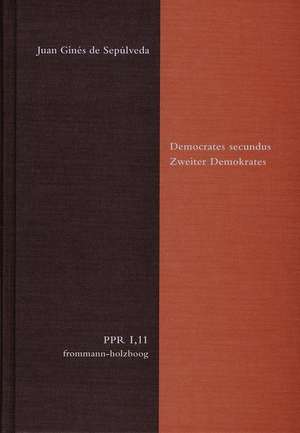Democrates Secundus. Zweiter Demokrates. Abteilung I: Texte. - PPR I,12: Politische Philosophie und Rechtstheorie des Mittelalters und der Neuzeit.
Autor Juan Ginés De Sepúlveda Editat de Thomas Duve, Alexander Fidora, Heinz-Gerhard Justenhoven, Matthias Lutz-Bachmann, Andreas Niederberger Traducere de Christian Schäferde Limba Germană Hardback – 30 apr 2018
Preț: 1372.48 lei
Preț vechi: 1673.75 lei
-18% Nou
Puncte Express: 2059
Preț estimativ în valută:
262.61€ • 274.22$ • 216.86£
262.61€ • 274.22$ • 216.86£
Carte indisponibilă temporar
Doresc să fiu notificat când acest titlu va fi disponibil:
Se trimite...
Preluare comenzi: 021 569.72.76
Specificații
ISBN-13: 9783772827006
ISBN-10: 3772827004
Pagini: 320
Dimensiuni: 173 x 244 mm
Greutate: 0.51 kg
Editura: Frommann-Holzboog
Seria Politische Philosophie und Rechtstheorie des Mittelalters und der Neuzeit.
ISBN-10: 3772827004
Pagini: 320
Dimensiuni: 173 x 244 mm
Greutate: 0.51 kg
Editura: Frommann-Holzboog
Seria Politische Philosophie und Rechtstheorie des Mittelalters und der Neuzeit.



